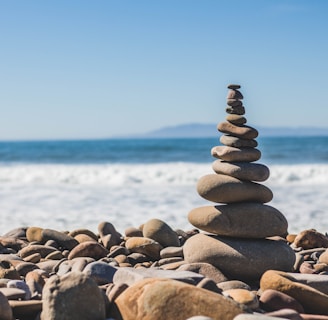

How Gentle Habits Boosted My Energy and Wellness
I’m writing this while sipping my morning matcha and watching the sunrise ease into the day.
A few years ago, I’d have been downing coffee after coffee and gearing up for a punishing dawn workout. Back then, I believed wellness meant going to extremes — intense diets, 5 A.M. bootcamps, and chasing endless productivity.
But over time, I’ve discovered something much more comforting:
⚠️ Real wellness doesn’t need to be extreme to be effective.
In fact, the most nourishing habits are often the simplest — the ones that flow naturally with our daily lives.
True wellness is about feeling energized and balanced, not drained.
Think about it — how we feel on a good day usually comes down to the little things: a restful night’s sleep, a hearty breakfast, a quiet walk in fresh air.
These small, steady habits work because they support our body’s natural rhythms.
Our bodies are incredible. They come with built-in rhythms and cues — hunger, sleepiness, bursts of energy — that guide us when we choose to listen. When we honor those signals, we naturally feel happier and healthier.
💡 Things to take with you
You don’t need extremes to thrive. Gentle wins last longer.
Your body’s signals are the ultimate biohack. Listen to them, and you'll thrive naturally.
Sleep isn’t lazy — it’s your secret weapon. Recharge fully, show up stronger.
Hydrate, nourish, and move with joy. Tiny daily habits = next-level energy.
Nature isn’t a luxury. It’s a reset button for your mind, body, and soul.
And when we ignore those signals, when we force ourselves into cycles of overwork, restriction, or stress, we’re not fixing the root cause of our fatigue or imbalance — we’re just chasing symptoms.
I’ve been there too — masking tiredness with caffeine, trying to “boost” energy with extreme diets, looking for quick fixes instead of gently supporting what my body was really asking for.
True health isn’t about patching up the surface, it’s about tuning in and supporting the deeper needs.
By learning to listen, to slow down, and to choose habits that respect our natural rhythms, I found more lasting energy — the kind that doesn't rely on extremes.


Trusting Our Body’s Natural Clock
While I love exploring wellness tools — from Ayurvedic wisdom to modern AI health trackers — I’ve realized that no app or ancient practice can replace the basics: listening to our bodies.
Technology can be helpful (and fun!) for spotting patterns, but it’s not about tracking more, it’s about understanding better. The real magic happens when we use these tools to support, not override, our natural rhythms.
Why focus on natural body rhythms?
Because fighting against them (like pulling all-nighters or crash-dieting) usually backfires.
I learned this the hard way: depriving myself of sleep or food in the name of “health” just left me exhausted.
And I’m not alone – about 1 in 3 adults reports not getting enough sleep daily, and many of us have tried unsustainable fads (hello, juice cleanse) only to end up feeling worse.
What really helped me start restoring my sleep routine and wake up naturally is a sunset simulation lamp (the exact model I use can be found on Amazon below). And it’s only the beginning of my better-sleep journey, but it’s made such a difference.
⚠️ Our bodies run on cycles – the most famous is the circadian rhythm, our ~24-hour internal clock that tells us when to wake, eat, and sleep.
When we sync up with this clock, everything tends to run smoother.
Ever notice how getting to bed by 10 or 11 pm and rising with the sun can make you feel refreshed, while pulling a late-night causes grogginess and a 3 pm slump?
That’s your natural rhythm at work!
Extreme habits (like drastic diets or overtraining) disrupt these cycles, leaving us out of sync. In contrast, gentle, consistent habits help steady our energy levels and mood.
Science backs this up too:
🔎 Extreme calorie-cutting often triggers the body’s “survival mode,” causing rebound hunger and weight gain (roughly 95% of dieters regain lost weight within two years). Meanwhile, consistent moderate habits are more sustainable and kind to our bodies.
So, what does “energy, not extremes” look like in practice?
It’s all about approachable habits that align with how our bodies naturally work. Let’s explore a few that have made a difference in my life and many of my friends’. No rigid rules – just warm, encouraging tips you can weave into your day.


1. Prioritize Consistent, Restful Sleep
It truly starts with sleep – the foundation of our daily energy.
There’s nothing trendy or extreme about getting a good night’s rest, but wow does it help! I used to sacrifice sleep to squeeze in late-night tasks, running on coffee and willpower.
Now I aim for a consistent bedtime, and it feels like a gift to myself.
Our bodies crave regular sleep times because hormones like melatonin* (which helps us sleep) follow a schedule. When you honor that schedule – say, winding down at a similar time each night – you support your natural rhythm.
*I’ve linked the same melatonin supplement I trust, in case you’d like to look into it 👇
💡 Consider making a gentle evening routine: dim the lights, put away screens, maybe read or journal.
This sends a signal to your body that it’s safe to relax.
As a result, you fall asleep easier and wake up more refreshed. It’s powerful how much better life looks after 7–8 hours of sleep
If you struggle with this, you’re not alone (many people do in our busy world), but small changes help: even consistent wake-up times can anchor your rhythm.
And remember, trading an hour of late-night TikTok for sleep isn’t a loss – it’s self-care.
You’ll likely gain energy, better focus, and even a brighter mood the next day.
⚡️ Chronic lack of sleep is linked to low mood and focus, which so many experience that it’s almost a public health issue
One more tip: don’t feel guilty for napping or resting when you need to. Listening to your body’s tired signals and taking a short nap or a quiet break can recharge you more than forcing through fatigue.
Rest is productive, too – it fuels all the other good things you want to do.


2. Move Your Body Gently (and Joyfully)
When you’re well-rested, it’s much easier to find the natural energy to move your body.
Forget the idea that you must punish yourself in the gym for hours.
Movement can (and should) be enjoyable!
Our bodies are meant to move regularly – but that could be dancing in your kitchen, a gentle yoga flow, or a brisk walk with your dog. The key is consistent, mindful movement that makes you feel good during and after, not exhausted or in pain.
I used to think only an intense workout “counted.”
Now I know even a 20-minute walk or stretching session can work wonders.
If you don’t always have time for long walks, or the weather in your area isn’t ideal for going outside regularly, I highly recommend getting a walking pad. It’s been such a great way to support both my physical and mental health.
💡 In fact, even moderate exercise has huge benefits: just 20 minutes of getting your heart rate up can boost your mood for up to 12 hours afterward.
Isn’t that amazing? That post-walk or post-dance class glow is real – you’re basically giving yourself a natural antidepressant and energy boost.
Try noticing your body’s own movement rhythm.
Maybe you have more energy in the late morning, so that’s a great time for a walk.
Or you get antsy sitting all afternoon – a short stretch or walk break could be your rhythm’s way of saying “let’s move.” Some days might call for gentle stretching, others you might crave a fun bike ride.
By tuning in, you’ll find the right amount of movement.
And don’t underestimate the power of stepping outside for that walk – you’ll get movement and a dose of nature (more on nature in a bit!).
If motivation is hard solo, make it social: join a casual sports club or invite a friend on an evening stroll. Moving together not only keeps you accountable, it turns exercise into a community connection – double win for wellness.


3. Nourish with Balanced and Regular Meals
Let’s talk food – not dieting, but nourishment.
In a world of extreme diets and “eat this, not that” noise, it’s easy to forget that eating well can be simple and enjoyable.
Supporting your body’s natural rhythms means fueling it consistently and with a balance of nutrients.
⚡️ Ever notice how you get “hangry” or fatigued if you skip a meal?
That’s your body’s rhythm reminding you it needs energy input.
🔎 “A small study found that acute low blood sugar can interrupt brain function and make cognitive tasks more difficult.”—The Real Reason We All Get Hangry Sometimes
Rather than ignoring those cues or forcing yourself into some fad fasting routine that feels terrible, try to eat in a pattern that keeps you steady.
For most people, that means three solid meals a day (and snacks if needed) with a mix of protein, healthy carbs, and fats.
When I shifted from erratic eating (starving then binging, or trying extreme low-carb) to regular balanced meals, my energy became much more stable.
No more 3 pm sugar crashes or late-night junk food raids.
The irony is, those extreme diets I attempted only made me obsess over food more, and inevitably I’d swing the other way. And again, I’m not alone – extreme restriction just isn’t sustainable.
The kinder approach is to listen to your hunger and fullness signals.
Your body generally knows when it needs fuel.
Skipping natural hunger cues can stress your system (and your mood), so I’ve learned to treat a growling stomach as important as a meeting reminder.
A few gentle habits:
✦ Start your day with a nourishing breakfast to kickstart your metabolism (it also tells your internal clock that it’s daytime, time to be alert).
✦ Include fruits and veggies throughout the day for vitamins and fiber – they help keep your digestion (another body rhythm!) regular.
✦ Enjoy your food! Mindful eating helps you tune into when you’ve had enough, preventing overeating naturally.
By giving your body steady, quality fuel, you’ll likely notice fewer energy slumps and cravings.
It’s like keeping a car filled with clean, regular gasoline instead of running on fumes and then overfilling the tank sporadically.
Balance is the goal, not perfection – and certainly not punishment.


4. Stay Hydrated – Water is Your Friend
Alongside food, hydration is a pillar of natural health. Our bodies are mostly water, literally – roughly 60% of an adult’s body is water
💡 Even our brains are about three-quarters water, which explains why dehydration can make us feel foggy.
So it makes sense that drinking enough fluids is crucial for feeling our best.
If you’ve ever had a day where you felt tired and headachy, then realized you barely drank any water, you’ve felt the effects of being out of sync with your hydration needs.
A gentle habit to adopt is keeping water handy and sipping throughout the day.
I carry a water bottle as my sidekick. It’s a small reminder to drink up.
You don’t need to chug gallons at once or follow some extreme water diet; just aim to drink when you’re thirsty.
Your body’s pretty good at signaling thirst – though often we’re so busy we ignore it. I sometimes set a little hourly reminder at work for a while, just to make hydration breaks a routine.
Why is this so important? Because even mild dehydration can sap your natural energy.
🔎 Studies show that being just 1–2% dehydrated (which can happen on a busy day before you even feel very thirsty) can impair concentration and mood
No wonder we get cranky when we forget to drink water!
By staying ahead on fluids – water, herbal tea, or foods with high water content like fruits – you keep your body in balance.
I personally feel a big difference: my skin is happier, I don’t get that afternoon slump as often, and even headaches are rarer now.
It’s such a simple thing, yet so effective. If plain water bores you, jazz it up with a slice of lemon or a splash of juice. Treat hydration as an act of kindness to your body, because it really is.


5. Get Outside and Soak Up Nature
When talking about natural rhythms, we can’t forget nature herself.
Our bodies evolved with the sunrise, sunset, and all the seasons of the Earth – it’s no wonder that spending time outside profoundly rejuvenates us.
Yet, it’s easy to get stuck indoors (I’m guilty of spending entire days in front of my computer).
Making it a habit to step outside, even for a little while each day, can realign you in ways you might not expect.
💡 Sunlight in the morning, for example, helps set your circadian clock.
I try to have my first cup of matcha by a window or on the porch if possible, to get that daylight in.
It truly helps me wake up naturally (bonus: vitamin D!)
During the day, a bit of fresh air can clear mental cobwebs. And in the evening, watching the sunset or simply enjoying cooler air can gently signal your body that it’s wind-down time.
Beyond the clock aspect, nature is just soothing.
Have you ever felt an instant calm wash over you hearing leaves rustle or birds chirp?
There’s science behind that: exposure to natural environments lowers stress and can even reduce blood pressure.
🔎 One large study found that spending at least 2 hours per week in nature is associated with significantly better health and well-being
Two hours a week breaks down to under 20 minutes a day – totally doable, right?
It could be a park walk during lunch, gardening in your yard, or a weekend hike. Think of it as refilling your human battery in the most natural charging station.
💡 If you live in a city, even city parks or a tree-lined street count.
I live in an urban area, but I’ve discovered a nearby community garden that I visit often; just being around the greenery and saying hi to neighbors there lifts my spirits.
Sometimes I’ll invite a friend for a walk in the park – combining outdoor time with social connection, which leaves me doubly refreshed.
The goal isn’t hardcore wilderness trekking (unless you love that!) but simply connecting with the outdoors in a pleasant way.
Your body’s senses come alive outside – the natural light, the smells of grass or rain, the feel of the breeze.
It gently reminds your system of its primal roots and resets your rhythm.
Whenever I return from even a short nature break, I feel more grounded and often more focused when I get back to whatever I was doing. It’s like a mini-vacation for your mind and body that costs nothing.


6. Manage Stress with Mindful Breaks
Wellness isn’t just about the physical stuff – it’s also about mental and emotional balance.
In today’s go-go-go culture, stress management is a gentle habit we all need.
⚡️ Supporting your body’s natural rhythms includes giving your mind time to rest and reset.
Think of stress like noise that can drown out your body’s signals.
When we’re stressed or anxious all the time, we might not sleep well, might forget to eat or overeat for comfort, and generally feel out of tune.
I know when I get too stressed, I start waking up at odd hours and my stomach gets upset – clear signs my natural rhythm is disturbed.
So what can we do?
We can’t eliminate all stress, but we can build little oases of calm into our day.
For instance, taking just 5 minutes to breathe deeply or do a short meditation can work wonders. When you take slow, deep breaths, it actually triggers your nervous system to calm down.
I often do a quick breathing exercise between work meetings: inhale for 4 counts, exhale for 6 counts, repeat for a few rounds.
It’s free and super effective at lowering that jittery feeling.
Sometimes stress comes from clutter — not just in our minds, but in our spaces too.
I’ve found that keeping my home and work area clean helps me breathe easier, literally and mentally. A tidy space feels more peaceful, and simple hygiene habits — like handwashing or fresh sheets — support both physical and emotional well-being.
It’s amazing how much lighter we feel when we take small steps to care for our surroundings. Wellness isn’t just about what we put into our bodies, but also about the environment we create around us.
Journaling for a few minutes, stretching, or even lying down with your eyes closed listening to a favorite song can also recentrer you.
The important part is consistency – just like brushing your teeth.
💡 Daily stress relief habits keep your baseline calmer.
This supports your natural hormonal rhythms; for example, stress hormones like cortisol can stay more balanced when you regularly unwind. (Chronic high stress can throw off things like your sleep-wake cycle and even appetite signals.)
One cool thing I learned is that stress and the circadian rhythm are interconnected – too much stress at the wrong times can disrupt your body clock.
So by managing stress, you’re literally helping your body keep its healthy daily rhythm.
Next time you feel guilty for taking a break, remind yourself that relaxation is productive too.
A calm you is a healthier you.
And don’t hesitate to reach out to others – sometimes a quick chat with a friend or a hug from a family member is the best stress relief there is.
We’re in this together, and supporting each other emotionally is a beautiful, community-minded habit.
In Tune with Yourself
As we wrap up, I hope you feel encouraged that wellness can be warm, inviting, and woven into normal life.
You don’t need to overhaul your life overnight or push yourself to extremes.
🔎 Key insights
As we’ve explored, the “secret” to energy is really no secret at all – it’s about working with your body’s natural rhythms through kind, consistent habits.
Each habit – from getting good sleep and gentle exercise, to eating and drinking well, managing stress, and stepping outside – is like a little gift to your future self. Over time, these gifts add up to a healthier, more energetic you.
Remember to be patient and kind to yourself.
Habits take time to form, and life will always have ups and downs.
Read customer reviews for the products mentioned below:
Why People Love SmartSleep
If you stay up late finishing a project one night or stress-eat a tub of ice cream (we’ve all been there!), don’t sweat it. Just return to your gentle routines the next day.


The Power of Sustainable Wellness
Your body is resilient and will thank you for every bit of care you give it. Real wellness is less about perfection and more about consistency and self-compassion.
Lastly, know that you’re not alone on this journey.
Embracing natural, balanced living can be even more meaningful when you share it with others. Maybe you encourage your family to set up a regular dinnertime (tech-free) together, or you start a little walking group in your neighborhood.
Perhaps you swap calming playlists or meditation tips with a friend.
💡 Wellness thrives in community – we uplift each other by sharing our experiences and cheering each other on.
I’ve found that talking about these gentle changes with friends has not only kept me accountable, it’s deepened our friendships. We bond over celebrating that we chose a walk over an extra episode on Netflix, or remind each other to drink water during a busy day.
In a world that often pushes us toward the extreme, choosing the path of energy, not extremes is a radical act of self-love and common sense.
By supporting your body’s natural rhythms, you’re doing something truly sustainable for your long-term health. And when you take good care of yourself, you have more positive energy to pour into the people and passions you love.
So go ahead and embrace those everyday wellness habits with a smile:
Rest well
Move joyfully
Eat and drink wholesomely
Breathe deeply, and step outside to smell the roses.
Your body and mind will all be better for it. Here’s to a gentler, naturally energized you!
--
Disclaimer: The information provided on the blog is for general informational and educational purposes only and is not a substitute for professional medical advice, diagnosis, or treatment. Consult with a qualified healthcare provider before making any health-related decisions
Disclosure: Some of the links here are affiliate links which simply means if you choose to buy through them, I may earn a small thank-you commission. It helps keep Demure Wink ad-free and focused on mindful, research-based content I love creating for you.
